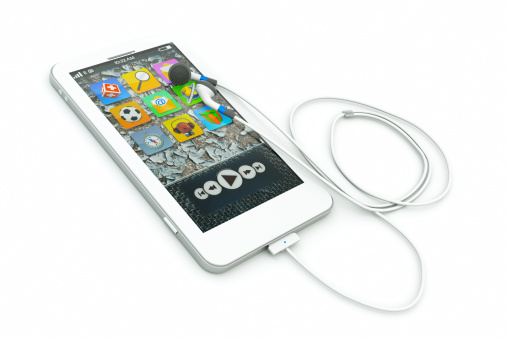
Hearing Damage From These Devices…
The amount of hearing damage created from music devices such as iPods depends on both the duration of the listening and the level of the volume. Listening to loud music for sustained amounts of time, damages the tiny hair cells in the inner ear and consequently, impairs your hearing. These cells are not meant to be hit with loud noise for long periods of time, yet 80 percent of people listen to their music devices at dangerously high volumes. According to hearing specialists, the maximum volume on the iPod is 10 times as loud as recommended listening settings and it reaches noise levels that are equivalent to rock concerts.
“Maximum” Volume and Hearing Problems
Turning down the iPod volume is not only important for the habitual user; even casual listeners need to be cautious with iPod volume levels. According to researchers at Harvard Medical School, the University of Colorado and the Fligor/Children’s Hospital Boston, listening to an iPod at full volume for a mere 5 minutes a day (using the iPod stock earphones) is enough to induce hearing loss in the average person. Noise isolator earphones are even worse – and just 3 minutes of listening to music on maximum volume per day with isolator earphones can create hearing problems.
The Damage of Listening to Loud Music – And Why You Need to Be Careful
Unfortunately, the damage caused by listening to loud music devices is irreparable and you have to live with the consequences for the duration of your life. And the damage is no laugh matter either. Since the introduction of the iPod, more than a few children and teenagers have experienced hearing loss that was great enough to necessitate hearing aids. Although these cases are rare, and there were other contributing factors, the hearing problems were considered mainly music-related. The damage caused by loud listening isn’t limited to hearing loss either, prolonged listening to loud music can also lead to ringing in the ears and even hypertension (elevated blood pressure).
If you are an avid iPod listener, worry not, because it is possible to enjoy the music experience without sacrificing your hearing in the process. People tend to listen to their music much louder in noisy environments, most likely as an attempt to drown out outside noise. Although noise isolator earphones cause the most damage when listened to on max volume, people who use these earphones tend to listen to their music at safer volume levels because the earphones drown out the outside noise for them.
The Earphones Slightly Less Likely to Cause Hearing Problems
In fact, studies show that only about 20 percent of people who use noise isolator earphones, listened to their music at sound levels that are considered risky, in contrast to the 80 percent of people who listen to dangerously loud music with other types of earphones. Earphones that sit over the ears are also considered less risky when it comes to hearing loss.
In addition to purchasing the right kind of earphones, you should utilize the iPod volume control setting which limits the volume output. Also, resist the urge to turn up the volume to more than 70 percent of its maximum output; anything louder and you put your hearing at risk. Finally, take a break from listening every 60 minutes to allow your ears some time to rest and recover.